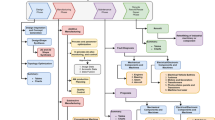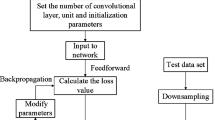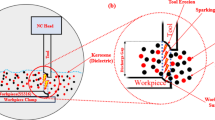Abstract
The quality prediction of machining processes is essential for maintaining process stability and improving component quality. The prediction accuracy of conventional methods relies on a significant amount of process signals under the same operating conditions. However, obtaining sufficient data during the machining process is difficult under most operating conditions, and conventional prediction methods require a certain amount of training data. Herein, a new multiconditional machining quality prediction model based on a deep transfer learning network is proposed. A process quality prediction model is built under multiple operating conditions. A deep convolutional neural network (CNN) is used to investigate the connections between multidimensional process signals and quality under source operating conditions. Three strategies, namely structure transfer, parameter transfer, and weight transfer, are used to transfer the trained CNN network to the target operating conditions. The machining quality prediction model predicts the machining quality of the target operating conditions using limited data. A multiconditional forging process is designed to validate the effectiveness of the proposed method. Compared with other data-driven methods, the proposed deep transfer learning network offers enhanced performance in terms of prediction accuracy under different conditions.






Similar content being viewed by others
Reference
He QP, Wang J (2018) Statistical process monitoring as a big data analytics tool for smart manufacturing. J Process Contr 67:35–43
Leali F, Vergnano A, Pini F et al (2016) A workcell calibration method for enhancing accuracy in robot machining of aerospace parts. Int J Adv Manuf Tech 85:47–55
Lee WJ, Mendis GP, Triebe MJ et al (2019) Monitoring of a machining process using kernel principal component analysis and kernel density estimation. J Intell Manuf 31:1175–1189
Gonzalez-val C, Pallas A, Panadeiro V et al (2019) A convolutional approach to quality monitoring for laser manufacturing. J Intell Manuf 31:789–795
Hassan M, Sadek A, Damir A et al (2018) A novel approach for real-time prediction and prevention of tool chipping in intermittent turning machining. CIRP Ann Manuf Techn 67(1):41–44
Zhao LP, Li BH, Chen HR et al (2018) An assembly sequence optimization oriented small world networks genetic algorithm and case investigate. Assem Autom 38(4):387–397
Du C, Ho CL, Kaminski J (2021) Prediction of product roughness, profile, and roundness using machine learning techniques for a hard turning process. Adv Manuf 9:206–215
Benkedjouh T, Medjaher K, Zerhouni N et al (2015) Health assessment and life prediction of cutting tools based on support vector regression. J Intell Manuf 26:213–223
Wang Y, Perry M, Whitlock D et al (2020) Detecting anomalies in time series data from a manufacturing system using recurrent neural networks. J Manuf Syst 62:823–834
Hu S, Zhang M, Cui Y et al (2017) Accuracy enhancement with processing error prediction and compensation of a CNC flame cutting machine used in spatial surface operating conditions. J Eng Technol Sci 49:75–94
Zhao Z, Wang S, Wang Z et al (2020) Surface roughness stabilization method based on digital twin-driven machining parameters self-adaption adjustment: a case investigate in five-axis machining. J Intell Manuf 33:943–952
Yin X, Niu Z, He Z et al (2020) An integrated computational intelligence technique based operating parameters optimization scheme for quality improvement oriented process-manufacturing system. Comput Ind Eng 140:106287. https://doi.org/10.1016/j.cie.2020.106284
Luo W, Hu T, Ye Y et al (2020) A hybrid predictive maintenance approach for CNC machine tool driven by digital twin. Robot Cim-Int Manuf 65:101974. https://doi.org/10.1016/j.rcim.2020.101974
Jovic S, Anicic O, Jovanovic M (2017) Adaptive neuro-fuzzy fusion of multi-sensor data for monitoring of CNC machining. Sens Rev 37(1):78–81
Bai Y, Sun ZZ, Zeng B et al (2019) A comparison of dimension reduction techniques for support vector machine modeling of multi-parameter manufacturing quality prediction. J Intell Manuf 30:2245–2256
Li BH, Zhao LP, Yao YY (2021) Failure time prognosis in manufacturing process using multi-dislocated time series convolutional neural network. P I Mech Eng E-J Pro 235(4):832–840
Aivaliotis P, Georgoulias K, Chryssolouris G (2019) The use of digital twin for predictive maintenance in manufacturing. Int J Comput Integ M 32(11):1067–1080
Liu C, Li Y, Zhou G et al (2016) A sensor fusion and support vector machine based approach for recognition of complex machining conditions. J Intell Manuf 29:1739–1752
Jiang P, Jia F, Wang Y et al (2012) Real-time quality monitoring and predicting model based on error propagation networks for multistage machining processes. J Intell Manuf 25:521–538
Diez-Olivan A, Pagan JA, Khoa NLD et al (2017) Kernel-based support vector machines for automated health status assessment in monitoring sensor data. Int J Adv Manuf Technol 95:327–340
Ren L, Meng Z, Wang X et al (2020) A data-driven approach of product quality prediction for complex production systems. IEEE T Ind Inform 17(9):6457–6465
Zhou X, Jiang P (2014) Variation source identification for deep hole boring process of cutting-hard workpiece based on multi-source information fusion using evidence theory. J Intell Manuf 28:255–270
Wuest T, Irgens C, Thoben KD (2013) An approach to monitoring quality in manufacturing using supervised machine learning on product state data. J Intell Manuf 25:1167–1180
Zhao L, He W, Li B et al (2019) Multi-gradient decoupling control of quality fluctuation in manufacturing process. In: IEEE/ASME international conference on advanced intelligent mechatronics (AIM), Hong Kong, China, pp 1539–1543
Liu Y, Yang C, Zhang M et al (2020) Development of adversarial transfer learning soft sensor for multigrade processes. Ind Eng Chem Res 59(37):16330–16345
Liu Y, Yang C, Liu K et al (2019) Domain adaptation transfer learning soft sensor for product quality prediction. Chemom Intell Lab Syst 192:103813
Sun C, Ma M, Zhao ZB et al (2019) Deep transfer learning based on sparse autoencoder for remaining useful life prediction of tool in manufacturing. IEEE T Ind Inform 15(4):2416–2425
Cao P, Zhang SL, Tang J (2018) Preprocessing-free gear fault diagnosis using small datasets with deep convolutional neural network-based transfer learning. IEEE Access 6:26241–26253
Acknowledgements
This study was supported by the National Natural Science Foundation of China (Grant No. 51675418).
Author information
Authors and Affiliations
Corresponding author
Rights and permissions
Springer Nature or its licensor holds exclusive rights to this article under a publishing agreement with the author(s) or other rightsholder(s); author self-archiving of the accepted manuscript version of this article is solely governed by the terms of such publishing agreement and applicable law.
About this article
Cite this article
Li, BH., Zhao, LP. & Yao, YY. Multiconditional machining process quality prediction using deep transfer learning network. Adv. Manuf. 11, 329–341 (2023). https://doi.org/10.1007/s40436-022-00415-z
Received:
Revised:
Accepted:
Published:
Issue Date:
DOI: https://doi.org/10.1007/s40436-022-00415-z




